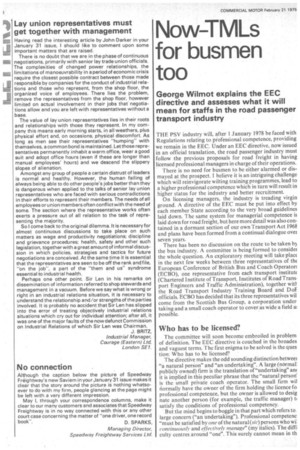Lay union representatives must get together with management
Page 48

If you've noticed an error in this article please click here to report it so we can fix it.
Having read the interesting article by John Darker in your January 31 issue, I should like to comment upon some important matters that are raised.
There is no doubt that we are in the phase of continuous negotiations, primarily with senior lay trade union officials. The complexities of changed power relationships, the limitations of manoeuvrability in a period of economic crisis require the closest possible contract between those made responsible by companies for the conduct of industrial relations and those who represent from the shop floor, the organized voice of employees. There lies the problem, remove the representatives from the shop floor, however limited on actual involvement in their jobs that negotiations allow and you are left with representatives without a base.
The value of lay union representatives lies in their roots and relationships with those they represent. In my company this means early morning starts, in all weathers, plus physical effort and, on occasions, physical discomfort. As long as men see their representatives "humping" with themselves, a common bond is maintained. Let those representatives permanently inhabit a warm office, wear a good suit and adopt office hours (even if these are longer than manual employees' hours) and we descend the slippery slopes of alienation.
Amongst any group of people a certain distrust of leaders is normal and healthy. However, the human failing of always being able to do other people's jobs better than they is dangerous when applied to the talks of senior lay union representatives who are faced with serious contradictions in their efforts to represent their members. The needs of all employees or union members often conflict with the need of some. The section where the representative works often exerts a pressure out of all relation to the task of representing the majority.
So I come back to the original dilemma. It is necessary for almost continuous discussions to take place on such matters as wage and productivity negotiations; discipline and grievance procedures; health, safety and other such legislation, together with a great amount of informal discussion in which policies, strategies and tactics for future negotiations are conceived. At the same time it is essential that the representatives are seen to be off the rank and file, "on the job", a part of the "them and us" syndrome essential to industrial health.
Perhaps one other point. Sir Len in his remarks on dissemination of information referred to shop stewards and management in a vacuum. Before we say what is wrong or right in an industrial relations situation, it is necessary to understand the relationship and/or strengths of the parties involved. It is probably no accident that Sir Len has slipped into the error of treating objectively industrial relations situations which cry out for individual attention; after all, it was one of the major faults of the now defunct Commission on Industrial Relations of which Sir Len was Chairman. J. BRITZ, Industrial Manager, Courage (Eastern) Ltd, London Set












































































































